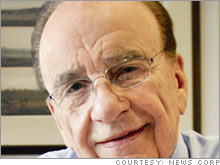The Rupert discountNews Corp.'s stock has lagged other media rivals since the company announced its $5 billion offer for Dow Jones in May. But are investors overreacting?NEW YORK (CNNMoney.com) -- Most News Corp. shareholders would probably have little complaint about how the enigmatic Rupert Murdoch has run the company for the past few years. The company's Fox television and cable networks as well as its movie studio have been solid performers. News Corp.'s global satellite television empire is rapidly growing. And the company has been widely praised on Wall Street for embracing the digital media world, with acquisitions of hot Web properties such as MySpace, IGN and Photobucket.
But is Murdoch's quest to take over newspaper company Dow Jones (Charts) tainting his reputation with News Corp. (Charts, Fortune 500) investors? For what it's worth, News Corp.'s stock is down more than 3 percent since the company announced on May 1 that it was offering $5 billion for Dow Jones, a more than 65 percent premium for the publisher of The Wall Street Journal. The decrease in News Corp.'s stock price may not seem that significant, particularly since shares are still up 4 percent so far this year. But it's worth pointing out that since early May, News Corp.'s stock has lagged the performance of several of its big media rivals. Shares of Time Warner (Charts, Fortune 500), which owns CNNMoney.com, are up 2 percent. Viacom's (Charts, Fortune 500) stock is up 3 percent and CBS' (Charts, Fortune 500) shares have gained 9 percent. Analysts said that some investors may be turned off by the fact that News Corp. is paying such a lofty price to increase its exposure in one of the company's slowest-growth businesses. Newspaper publishing accounted for 13 percent of the company's total operating income in News Corp.'s most recent quarter but profits were flat. Still, several said they did not think Dow Jones would break News Corp.'s bank. "The stock is in the penalty box because the fact that Rupert is making another acquisition," said Alan Gould, an analyst with Natexis Bleichroeder. "But given the size of News Corp., to pay $5 billion for Dow Jones, it isn't a big deal. Is Murdoch potentially overpaying by $1 billion? Yes. But is it significant in the grand scheme of things? Not really." To that end, Bear Stearns analyst Spencer Wang wrote in a research note Tuesday that he thinks the risk of Dow Jones being a complete bust for News Corp. is already factored into News Corp.'s stock price. So Dow Jones isn't the major issue. Instead, he thinks some investors may be fearful that the bid for Dow Jones is a sign that Murdoch plans to make even more expensive purchases in the future. "The risk is that while a potential Dow Jones acquisition, in and of itself, is fairly minor in scope relative to News Corp., it may be indicative of future capital allocation decisions," Wang wrote. These concerns may be intensified due to the fact that News Corp. appears to be trying to build up a war chest by selling off other assets. On Monday, Gemstar-TV Guide (Charts), which News Corp. owns a more than 40 percent stake in, said it was looking for a buyer. News Corp. has also stated that it is exploring the sale of nine of its Fox affiliated television stations as well as its outdoor advertising business. But Scott Black, president of Delphi Management, an institutional investment firm based in Boston that owns about 475,000 shares of News Corp., said he does not believe Murdoch is about to embark on a lavish shopping spree. "I'm not really worried. This is a one-off deal since Dow Jones is a trophy franchise," said Black. "This is not indicative that News Corp's going to go out and buy Gannett, for example, or make more investments in traditional newspapers." Black added that a Dow Jones acquisition, while pricey, does make sense for News Corp. since the company is planning to launch a Fox Business News cable channel later this year. And even though he joked that the word "synergy" is often overused when touting mergers, he truly believes that News Corp. will be able to reap the benefits of owning Dow Jones. Black said there are opportunities for cost cutting as well as the ability to cross-promote Dow Jones publications not just on the new business channel but also on Fox News and throughout News Corp.-owned or controlled global satellite networks such as Sky Italia and British Sky Broadcasting (Charts). "I realize synergy is a word that's bandied about a lot. But there are a lot of opportunities to extract value from Dow Jones," he said. Natexis Bleichroeder's Gould owns shares of News Corp. but his firm has no banking ties to the company. Bear Stearns' Wang does not own News Corp. stock and his firm has not done banking for the company. The reporter of this story owns shares of Time Warner through his company's 401(k) plan. |
Sponsors
|



